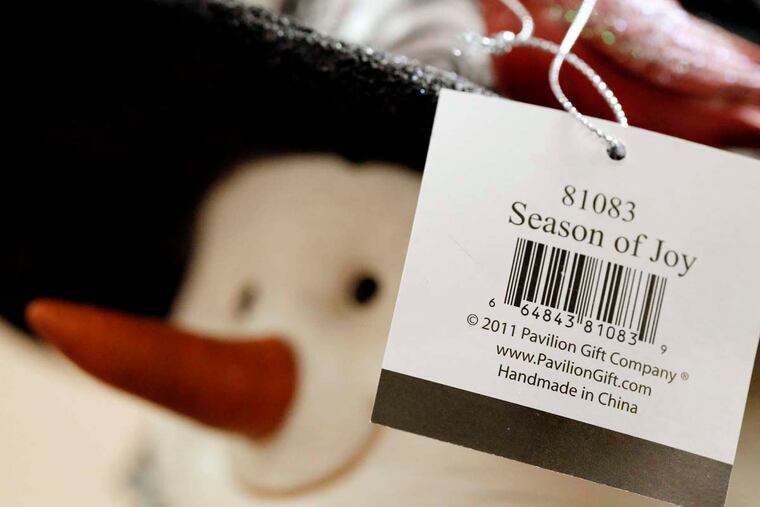China-Taiwan détente could remake retail
Joe McGrath is senior vice president of the home store division for Reading-based Boscov's. He is charged with buying anything for the home to stock all 44 Boscov's stores regionally.

Joe McGrath is senior vice president of the home store division for Reading-based Boscov's. He is charged with buying anything for the home to stock all 44 Boscov's stores regionally.
He said about 25 percent of the products he orders come from China, where "the quality and workmanship has improved."
Retailers, vendors, and merchants are taking note of what appears to be a thawing of relations between China and Taiwan. Some say the meeting between the leaders of both this month - viewed by some as détente, though it's too early to call it that - could mean better economic ties between the two and steady prices on products, such as clothes and electronics, that are made in both.
"If the warming up continues, American consumers can expect steady prices in stores," said Z. John Zhang, director of the Penn Wharton China Center. "If it does not, prices can go up in the short run. It is not likely that the prices from Taiwan and China can go down."
China's president, Xi Jinping, and Taiwan's President Ma Ying-jeou came together on neutral ground in Singapore on Nov. 7. It was the first meeting since the Chinese Communist Revolution. Although no pact resulted, both leaders hailed the event as a sign of a new stability.
It has been a long time coming. When Chiang Kai-shek and the Nationalists fled to Taiwan in 1949 after losing a civil war to Mao Tse-tung and the Communists, it led to decades of division and distrust.
In the 1980s, Deng Xiaoping, who controlled the Communist Party after Mao, pushed hard for capitalism to flourish in China after a 40-year absence, and created manufacturing jobs in special economic zones. Many firms left Taiwan and Japan and set up in China because of cheaper labor.
"The relationship between China and Taiwan has been warming up steadily since 2008, but many issues are boiling up from below," said Zhang, who taught a management course to executives of China's largest dairy company at the Penn Wharton China Center in Beijing last week.
He says the Nov. 7 meeting was historic on two fronts. "First, it is an exclamation point to a period of history when both sides focused on economic relationships while setting aside contentious political issues," Zhang said. "Second, the meeting is, in a way, the last-ditch effort on both sides to keep, consolidate, and continue the momentum of the past six years, which is clearly losing steam.
"The Nationalist government is expected to be voted out of office in the upcoming election [next year], and the next government in Taiwan will not be as gung-ho as the previous one about warming up the relationship," he said. "In this context, business opportunities for U.S. firms may materialize in different ways."
Here are some possibilities:
Taiwanese enterprises will continue to enjoy some favorable incentives and policies in mainland China, as the government tries to bring Taiwan into its economic orbit with the ultimate goal of political reunification.
"There is no reason" to doubt that these policies will last, Zhang said. "To the extent they will, and are likely to be enhanced, companies like Apple will surely benefit, but the same cannot be said about companies like Wal-Mart. Chinese retailers from both sides of the Taiwan Strait are fierce competitors for U.S. retailers."
The Trans-Pacific Partnership (TPP) Agreement negotiated this year by the U.S. and including Australia, Brunei, Canada, Chile, Japan, Malaysia, Mexico, New Zealand, Peru, Singapore, and Vietnam, may create a new economic dynamic in Southeast Asia. Taiwan may feel less dependent on China's economy, and investments may move away from the mainland to TPP countries.
"The best scenario for lower prices [for American consumers] will most likely hinge on the TPP, where more products in the U.S. could come from lower-cost regions like Vietnam," Zhang said.
Shyrrel Tupas-Balmores, general manager of the Limited women's clothing store at Oxford Valley Mall in Langhorne, said most of the store's apparel was made in China, Indonesia, Vietnam, and other Asian countries. A random check of labels at the Macy's a few doors down turned up the same thing.
"It might be cheaper to import from these places," Tupas-Balmores said of the TPP, "which could be handed down to consumers in the long run."
Meanwhile, Taiwan is known for electronics, bicycles, and semiconductors. David Karpay, 26, a sales associate for Best Buy, lived a year each in mainland China and Taiwan. He said he recalled seeing the protests in Taiwan last year among those wanting to preserve Taiwan's sovereignty.
While at work recently at the Best Buy in Fairless Hills, Karpay held up a $19.99 computer cable lock by the company Targus and a $129 prepaid smartphone by HTC, both made in Taiwan.
"There's still tension" between the mainland and the island, he said. "If more firms return to Taiwan, then there will be more opportunities for jobs there. Anything that improves workers' lives and increases profits for the seller is ideal."
But economist Joel Naroff, of Naroff Economic Advisors Inc., said it will be business as usual: "They will always be competitors and will still want to cut each other's throats."
215-854-4184